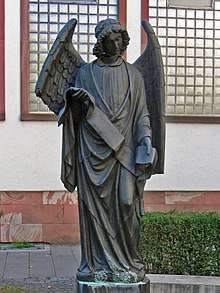Rosemarie Trockel
Rosemarie Trockel (born 13 November 1952) is a German conceptual artist.[1] She has made drawings, paintings, sculptures, videos and installations, and has worked in mixed media.[2] From 1985 she made pictures using knitting-machines.[1] She is a professor at the Kunstakademie Düsseldorf, in Düsseldorf in Nordrhein-Westfalen.[3]
Rosemarie Trockel | |
|---|---|
 The Frankfurter Engel, in Klaus Mann Platz, Frankfurt am Main; 1994, cast iron | |
| Born | 13 November 1952 Schwerte, North Rhine-Westphalia, Germany |
| Nationality | German |
Notable work | Cogito Ergo Sum (1988) |
| Awards | Wolf Prize in Arts (2011) |
Life
Trockel was born on 13 November 1952 in Schwerte, in Nordrhein-Westfalen in West Germany. Between 1974 and 1978 she studied anthropology, mathematics, sociology and theology while also studying at the Werkkunstschule of Cologne, at a time when the influence of Joseph Beuys was very strong there.[1][2]
In the early 1980s Trockel met members of the Mülheimer Freiheit artist group founded by Jiří Georg Dokoupil and Walter Dahn, and exhibited at the women-only gallery of Monika Sprüth in Cologne.[1][4]
Work
In 1985 Trockel began to make large-scale paintings produced on industrial knitting machines. These regularly featured geometric motifs or logos such as the Playboy Bunny or a hammer and sickle, and the trademark: "made in West Germany".[4] During the 1980s Trockel also worked for the magazine Eau de Cologne, which was focused on the work of women artists.[5]:252
In 1994 she created the Frankfurter Engel monument for the city of Frankfurt.[6] Since the late 1990s Trockel has worked extensively with clay and has also continued to produce both hand and machine knitted "paintings". Several of these paintings were exhibited in her major mid-career retrospective, Post-Menopause at the Ludwig Museum in Kessel in 2005 – a title which has been read as a comment on women artists who only receive recognition at a late stage of their lives.[5]:252 In 2011 she won the Wolf Prize for painting.[3] In 2012 an exhibition of her work travelled from the Museo Nacional Centro de Arte Reina Sofia in Madrid to the New Museum in New York, the Serpentine Gallery in London and the Kunst- und Ausstellungshalle der Bundesrepublik Deutschland in Bonn.[4]
Trockel's work often criticises the work of other artists or artistic styles such as minimal art.[5]:252
Exhibitions
References
- Nina Lübbren (2006). Trockel, Rosemarie. Grove Art Online. Oxford Art Online. Oxford: Oxford University Press. (subscription required).
- Tröckel, Rosemarie. Benezit Dictionary of Artists. Oxford: Oxford Art Online, Oxford University Press. (subscription required).
- Rosemarie Trockel Winner of Wolf Prize in Painting / Sculpture – 2011. Wolf Foundation. Accessed September 2017.
- Lynne Cooke (2012). Rosemarie Trockel: A Cosmos. Madrid: Museo Nacional Centro de Arte Reina Sofia. ISBN 9781580933469.
- Mirjam Westen (2009). Rebelle: Art & Feminism 1969–2009 (exhibition catalogue). Arnhem: Museum voor Moderne Kunst Arnhem. ISBN 9789072861450.
- Frankfurter Engel oder Mahnmal Homosexuellenverfolgung (in German). Kulturamt Frankfurt am Main: Abteilung Kunst im öffentlichen Raum. Accessed September 2017.
Further reading
- J. Koether (1987). Interview with Rosemarie Trockel. Flash Art (International) 134, pages 40–42
- Sidra Stich (editor) (1991). Rosemarie Trockel (exhibition catalogue). Boston: The Institute of Contemporary Art; Berkeley: University Art Museum.
- Birte Frenssen, Rosemarie Trockel (1998). Rosemarie Trockel, Werkgruppen 1986-1998 : Köln, Brüssel, Paris, Wien I, Wien II, Opladen, Schwerte, Düren, Hamburg (exhibition catalogue). Köln: Oktagon.
- G. Theewen (editor) (1997). Rosemarie Trockel: Herde. Köln: Salon Verlag.
- Rosemarie Trockel (2005). Rosemarie Trockel: Post-menopause. Köln: W. König.
- Ann-Sofi Noring (editor) (2019). Rosemarie Trockel: The Same Different. Malmö : Moderna Museet Malmö ; London ; Köln : Koenig Books.